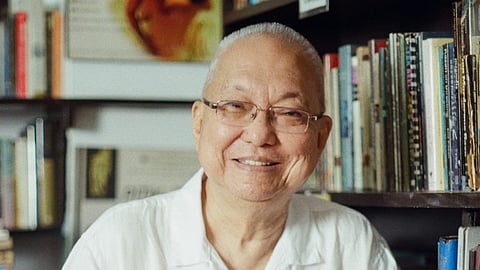
- NEWS
- the EDIT
- COMMENTARY
- BUSINESS
- LIFE
- SHOW
- ACTION
- GLOBAL GOALS
- SNAPS
- DYARYO TIRADA
- MORE

National Artist Ricky Lee recently experienced a deeply moving moment, witnessing the stage adaptation of his acclaimed debut novel, Para Kay B. The experience was a whirlwind of emotions, filled with awe, laughter and tears, as his beloved characters came to life in a new medium.
“Masarap (feels good), very fulfilling,” Lee shared in an interview, expressing his satisfaction with the theatrical rendition. The novel, published in 2008, had long been a subject of interest for film adaptations, but Lee himself found the task daunting.
“Kasi ako mismo (Even I), years and years ago, immediately after the novel came out, gusto siya gawing pelikula (I wanted to make it into a movie). And actually I commissioned my producers para gawing pelikula itong para kay B (to make Para Kay B into a movie). But, at that time, it was difficult. Ilang attempts ko sinubukan. Parang hihirap-hihirap ang buhay, ang dami-daming kwento (I tried many times, but it was difficult),” Lee explained, highlighting the complexity of translating the rich narrative for the screen.
However, the stories within Para Kay B were destined to be told. They found their voice on the stage. Lee revealed that despite previous runs of the play, this was his first time witnessing the adaptation. “Nagulat ako, naiyak ako, natawa ako (I was surprised, I shed tears, I laughed),” he said, describing his emotional response. “First time ko napanood. Hindi ko napanood yung dalawang nakaraang run niya. Kaya kanina na, at nabuhay nila yung napakahirap buhayin na material (It was my first time to watch the play. I did not watch the other two runs. They were able to bring the material to stage no matter how difficult it was).”
The crucial question: did the adaptation capture the essence of the novel? “Yes,” Lee affirmed without hesitation. He acknowledged the distinct artistic languages of theater and literature, but emphasized that the play successfully retained the novel’s core.
Para Kay B is more than just a collection of love stories; it’s an exploration of a writer’s faith in the power of storytelling. Lee explained that the narrative delves into the belief that words can shape reality, even one’s own life. However, it also confronts the limitations of writing.
“Pero (But), even if there are limitations, tinanggap niya (he accepted them) — even with pain, I’ll continue living, I’ll continue writing even if I accept na hindi ko mabuhay sa pag-ibig (That I can’t live on love alone),” he added, highlighting the resilience of the writer’s spirit.
Ricky Lee’s experience underscores the enduring power of his work and the transformative nature of art, as his literary creation found new life on the stage.
